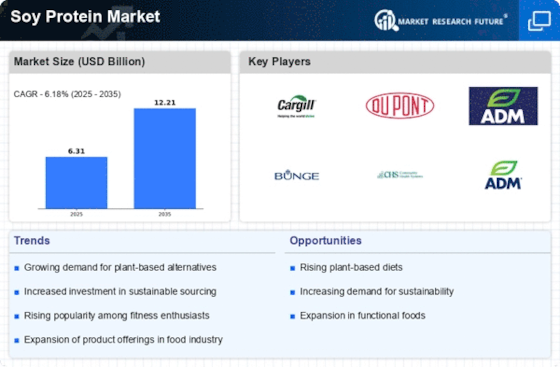Top Industry Leaders in the Soy Protein Market

The soy protein market has witnessed remarkable growth in recent years, propelled by the increasing demand for plant-based protein sources and the growing awareness of health-conscious consumers. The competitive landscape of this market is marked by both established players and emerging companies, each contributing to the dynamics of the soy protein segment.
Key Players:
Archer-Daniels-Midland Co. (US)
Ingredion (US)
Solae (US)
Dupont (US)
Solbar (Israel)
Cargill (US)
Gushen Biological Technology Group Co. Ltd. (China)
Bunge
Strategies Adopted:
The soy protein market employ various strategies to maintain and enhance their competitive positions. Product diversification is central to their approach, with companies continually introducing new soy protein formulations to cater to evolving consumer preferences. Strategic partnerships with food manufacturers and suppliers ensure a reliable supply chain of high-quality soy protein ingredients. Furthermore, marketing efforts focus on promoting the nutritional benefits of soy protein, emphasizing its role in a healthy and sustainable diet.
Market Share Analysis:
The soy protein segment involves considering several key factors. Brand recognition and consumer trust are pivotal determinants, with consumers often choosing soy protein products from well-established and reputable companies. Distribution networks and partnerships with food and beverage producers contribute significantly to market share, ensuring that soy protein products are readily available and incorporated into various applications. Pricing strategies, quality assurance, and adherence to sustainability practices also play a crucial role in influencing market share dynamics in the soy protein market.
News & Emerging Companies:
The soy protein market has seen the emergence of new players capitalizing on the rising popularity of plant-based protein sources. Start-ups such as PureProtein Innovations and NutriSoy Solutions have entered the market, offering innovative soy protein products with unique formulations and applications. These emerging companies contribute to the diversification of the soy protein segment, introducing novel products and catering to niche markets with specific dietary preferences.
Industry Trends:
The soy protein market reflect the evolving landscape of consumer preferences and the growing emphasis on sustainable and plant-based diets. Key players are actively investing in research and development to create new soy protein offerings that align with evolving dietary trends, such as clean-label and allergen-free formulations. Investments in sustainable sourcing practices and eco-friendly processing methods are gaining prominence, reflecting the increasing consumer demand for responsibly produced soy protein products. Additionally, companies are exploring digital marketing strategies and e-commerce channels to reach a broader consumer base, adapting to the evolving dynamics of consumer shopping behaviors in the soy protein segment.
Competitive Scenario:
The soy protein market is dynamic, with companies continuously adapting to changing consumer preferences and market trends. The focus on plant-based diets and sustainable protein sources has intensified competition, prompting companies to highlight the nutritional benefits and versatility of soy protein. The battle for shelf space in supermarkets and online platforms further heightens the competitive landscape, leading companies to differentiate themselves through marketing, branding initiatives, and a commitment to providing soy protein products that meet various dietary needs.
Recent Development
The soy protein market witnessed significant developments. Archer Daniels Midland Company unveiled a breakthrough in soy protein isolate technology, improving the solubility and flavor profile of its soy protein products. Cargill Inc. announced a strategic partnership with a leading plant-based food company to co-develop innovative soy protein-based meat alternatives, tapping into the surging demand for plant-based protein in the alternative meat sector.
International Flavors & Fragrances Inc. (IFF), following its acquisition of DuPont's Nutrition & Biosciences unit, integrated its expertise to launch a line of soy protein-based nutritional solutions, catering to the growing trend of personalized nutrition. Kerry Group expanded its soy protein concentrate production capacity to meet the increasing demand from the food and beverage industry. Wilmar International Limited invested in sustainable soybean farming practices for its soy protein supply chain, aligning with the rising consumer demand for ethically and responsibly sourced soy protein products. These developments underscore the competitive nature of the soy protein market, with companies actively innovating and adapting to meet evolving consumer expectations and secure their positions in this dynamic and growing industry.











